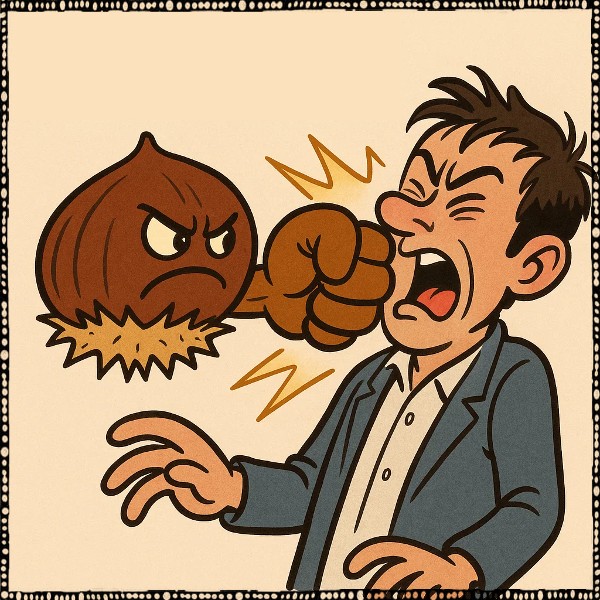Oui en effet Liz, bravo pour cet accord parfait 👏👏👏
French Expressions and Idioms
Have you heard of “idiomatic expressions”? These are figurative expressions specific to French, that are usually not translatable directly, as each language uses its own references! Therefore, you need to learn them directly in the language, as well as learning French equivalents to the ones you use in English! Knowing idiomatic expressions is key when learning a new language and it will definitely help you sound like a true Français 😊
✍️ Today’s French expression is:

“Se prendre une châtaigne”
🎧 Here’s a podcast about it!
Want to learn more about this fun expression, what it means, and hear some in-context examples? Then listen to Aurélie and Céline‘s related podcast below:
🌰 Some context
The expression “Se prendre une châtaigne“ dates back to 20th century Southern France. In the region’s dialect, the word “castagne” – which meant “chestnut” – was also used to mean “a blow” or “a fight”. This expression remains more familiar, so best to avoid using it in a formal context!
👀 How about some examples?
To help you commit this expression to memory, here are some useful examples of how to use it in context:
- – Aïe ! Ça fait mal !
– Qu’est-ce qui s’est passé ?
– Je me suis pris une châtaigne en touchant ce fil électrique !
- Cette prise électrique est défectueuse. Fais attention de ne pas te prendre une châtaigne en la touchant !
- – Tu as regardé le match de boxe hier soir ?
– Oui ! Au dernier round, l’un des combattants s’est pris une belle châtaigne en plein visage !
- Vincent a insulté la mère de Bertrand, et là, paf ! Il s’est pris une sacrée châtaigne !
🙌 Now is your time to shine!
Challenge yourself to use this expression in a French conversation or piece of writing, and let us know what you thought of this expression, share your idiomatic sentences, and tell us how your French friends reacted to it – en français bien sûr – in the comments below 🙂
À toi de jouer !
Hi Céline,
If we're talking about a female getting an electric shock, do you say 'elle s'est prise une châtaigne'? Many thanks